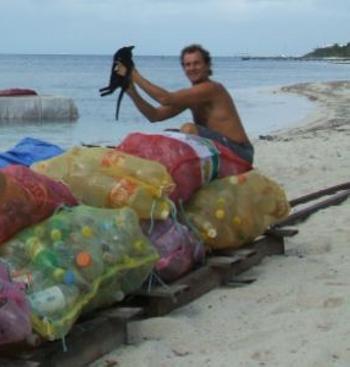
Mexico – Oct 13 A British man has gone one better than David de Rothschild’s Plastiki, and created an island home in the Caribbean with 120,000 plastic bottles.
Richard`Rishi” Sowar used the rubbish that would otherwise have been buried in landfill to create Spiral Island 2 in a lagoon off Mexico’s Caribbean coast.
Filling fabric bags with the discarded bottles and then attaching them to pallets, the environmentalist’s island has a house, beaches, two ponds and even boasts a solar-powered waterfall.
Situated in Isla Mujeres near the tourist resort of Cancun, it appears Rishi has created his very own piece of paradise.
“I’m not a scientist, but I just believe in the power of nature,” he said.
“I get my bottles to do this from the local rubbish tip.
“We have a big problem with rubbish. If we start to make more bottle islands we don’t have to look for places to put it (the bottles). It turns to treasure it creates land.”
Rishi claims the bottles, though man-made, easily fit in with their surroundings with coral taking root on the underside of his home as he continues to expand.

He uses a boat to get to the shore and receives visitors from around the world keen to help with his ambitious project.
The island is the second built by Rishi.
In 1998 he created a much larger one using 250,000 bottles off Puerto Aventura, Mexico, but it was destroyed by Hurricane Emily in 2005.
Spiral Island II has been built in a location where it should be protected from the extremes of nature.
3 Responses
Uhhh, so what happens when all those bottles get set free into the ocean (from a hurricane)? I guess they get collected in one of the REALLY large plastic islands found in the Pacific. I really like the concept though! Probably don’t want many people doing it though…
awesome!
This is all very inspiring, and great to see you on your island. I lived on a caribbean island for 2 years working as an Architect and Sailor, which is essentially what you are doing!!
I hope we see more people like yourself and David De Rothschild, taking waste and doing something resourceful with it. I hope we can do more stuff like this in the UK, and perhaps bring this innovation to the cities, where it is most needed. Plastic is a huge problem, and short of banning production, we need to find alternatives. I am carrying out research and blogging on how to minimise plastics in the construction industry, so if you have any ideas, please do get in touch. Cheers and good luck, Tom